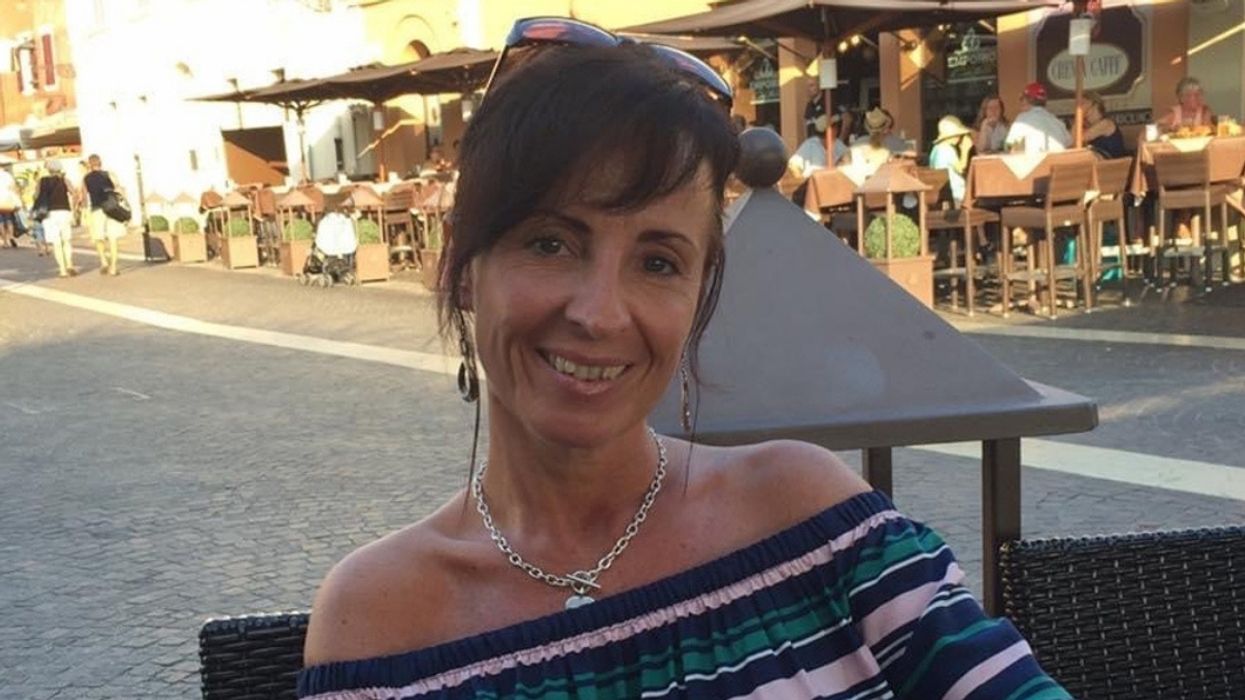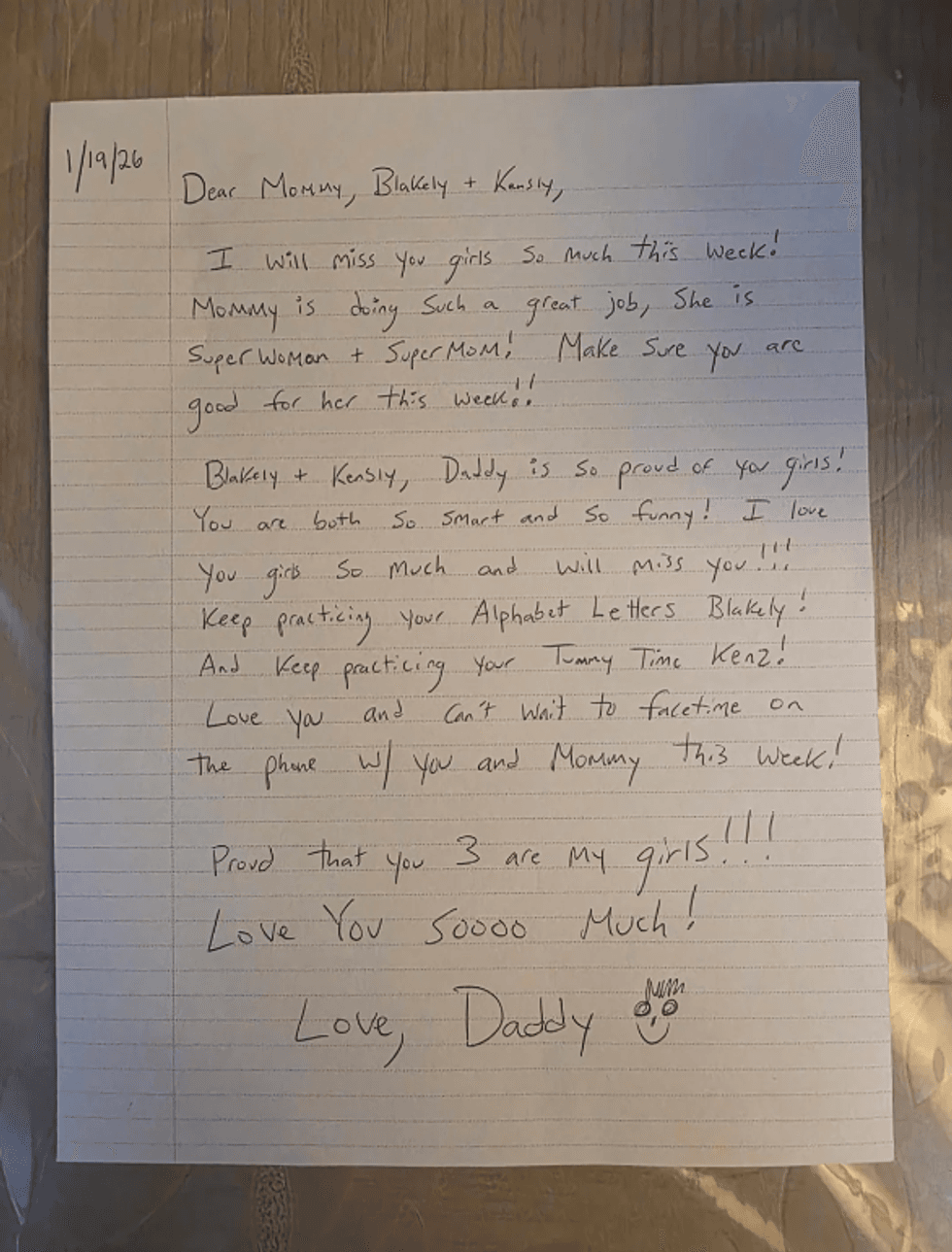A non-smoking mom who worked for the NHS for nearly 30 years is desperate to raise at least $9,400 a month to fund private treatment for stage four lung cancer.
Caroline Roberts ate well, worked out three times a week, and had never smoked so when she developed a nasty cough in 2018 she thought it was a simple winter cold.
When her symptoms persisted, she asked a colleague to refer her for a precautionary chest X-ray, only for a worrying mass to be found. That triggered further investigations, which led to her shocking diagnosis in January 2019 of stage four lung cancer.

She currently lives with her husband Chris, and their children Max, and Alice.
Now, they are focused on raising $9,400 a month for private treatment, and any additional costs as she has exhausted all her NHS options.
People have already donated more than $40,000 through her GoFundMe page.
“I am so grateful to them for giving me hope," she said. “Since my diagnosis, I've spent every Christmas, every birthday and every anniversary wondering if it'd be my last."

“On my 40th birthday in February 2011, my family and I went to Dubai. We decided when we were out there that we'd do it again for my 50th. I need to do everything I can to make sure I'm still here to see that through," she continued.
“I've been fighting for my life for 18 months now and to have whether I live or die come down to money is devastating. I can't help but think, 'Is that all my life is worth?'"
“Neither I nor Chris have worked since my diagnosis so we don't have any income. Every penny that people donate would mean the absolute world to us."
Roberts has been working for the NHS since she was 21. So, healthcare has always been of paramount importance to Caroline, whose work involved supporting patients in a busy GP surgery, where pamphlets and posters listing symptoms of common life-threatening conditions adorned the walls.
“Part of my role was to promote health awareness, so I thought I knew exactly what was out there," she said. “And, while non-smokers can get lung cancer, many of us can't help but automatically connect it to smoking in our minds."
“Being a fit and healthy non-smoker, I never dreamed this would happen to me."

Roberts recalled how the persistent cough, which was joined just weeks later by another unusual symptom.
“At the end of November 2018, my family and I went out to a Christmas market. While we were there, the flashing lights started to really hurt my eyes. I said to my husband Chris, 'Something is wrong here,'" she said.
“I took myself home to rest, but by the morning, it was no better. I never took sick days, but I decided to work from home to give myself a chance to rest."

The following morning, Roberts spoke with her GP, who sent her to the eye casualty department of Leicester Royal Infirmary to be assessed. There, a scan revealed a mass behind her right eye.
Unsure of what it was, doctors referred her for further tests at the more specialized Royal Hallamshire Hospital in South Yorkshire.
“It was a bit of a wait for my appointment, so knowing that I would have so much on my mind, I decided to work from home until I'd been seen," she explained.

“I went into the surgery to get all my things, and as I was doing so, I asked one of the GPs if they could refer me for an X Ray," she added. “On top of the eye pain, I still hadn't shaken my cough and was getting sick of it."
Tragically, the results of the X ray also revealed a mass, this time in Roberts' right lung.
When she went to Sheffield for her next appointment, armed with the results of her chest scan, doctors began to fear something was seriously wrong and performed a full-body CT scan.
Just 24 hours later, they called Roberts with the heartbreaking news that she had incurable stage four lung cancer.
“My world was shattered," she recalled. “My son Max was supposed to be coming over that day to celebrate a new job he'd got, and Alice, my daughter, was due home from university the following day."
“I just kept thinking, 'How do I tell my children?' At that point, I didn't know if I had days, weeks, months or years left. One of the hardest parts of all this – even today – is not knowing what's coming next."

To get a more precise diagnosis, Roberts was booked in to see a lung specialist.
“Christmas is supposed to be a happy time for all the family to get together, but none of us wanted to celebrate," she said.
“We didn't put a tree up, or any cards. It didn't feel right. I had no idea if that was going to be my last Christmas."

On 27 December, Roberts met with her lung specialist, who performed a biopsy and confirmed that she had non-small cell lung cancer which had spread to her eye, shoulder, spine and lymph nodes.
“I was told that I could have treatment, but that it was palliative, not curative. I'd gone from fit and healthy to terminally ill in a matter of weeks," she said.
In January 2019, Roberts began taking daily doses of a targeted therapy drug.

Just two months later, an MRI scan revealed nine lesions on her brain.
As the drug would be ineffective in treating them, she also needed a form of radiation treatment, where highly-focused beams precisely target very small areas of the brain without damaging healthy surrounding tissue.
But in August, the good news showed that the treatment had been successful.
Sadly it was short lived, as further tests in October revealed that she had become resistant to the drug, meaning she had to begin aggressive intravenous chemotherapy.
Alongside the chemotherapy, she also had immunotherapy.
“I'd have to go into hospital and be hooked up to a drip, then have two bags of chemotherapy drugs and two of immunotherapy drugs pumped into my body," she said.
“The side effects were horrendous. They were exactly what you think of when you think of cancer treatment – I lost my hair, I was nauseous, I was fatigued."

After four rounds, Roberts stopped having chemotherapy in January 2020, but continued to have immunotherapy. And in March, a scan showed she was responding well to treatment, as none of her tumors had grown.
Continuing to receive immunotherapy every three weeks, in June, another scan brought terrible news.
“Because of the coronavirus, there had been a slight delay in me having my scan," she said. “It was only a few weeks – but in cancer time, that can be a lifetime."

“I feel very lucky to have received treatment throughout the pandemic, as I've read about so many people that haven't been able to," she continued.
“But every moment I have is precious and, sadly, by the time I had my scan in June, my original tumor on my right lung had doubled in size and a new one had grown."
“I also have tumors now on my hips and liver and too many lesions on my brain to count. Basically, my treatment had stopped working and the cancer has expanded its journey of destruction throughout my body, shortening my life."
Roberts is now having four more rounds of chemotherapy.
According to NICE guidelines, the treatment can be available on the NHS through the Cancer Drugs Fund, but only in cases where the patient has a specific mutation known as T790M.
To date, doctors have not been able to obtain a biopsy result accurate enough to confirm whether or not Roberts has the mutation.
“That's the real sting in the tail," she said. “If we could get a biopsy that proved I had the mutation, I might be able to get the drug tomorrow. But nobody can tell me if I do or not. I feel like I've been left on the shelf."
Since she dedicated her life to working for the NHS, the news are particularly painful.
“I know it isn't personal and that rules are rules, but it's such a cruel twist of fate," she added. “The NHS doesn't owe me anything, but I do wish they could cut me some slack, after I served them for almost 30 years."
“I don't want to be a private patient, but what choice do I have?"
Now, Roberts and her loved ones must raise $9,400 to fund each 30-day course of Osimertinib and have launched a GoFundMe page.
Due to meet with a specialist imminently to discuss her next steps, she hopes to be on the drug by the end of September.
“I've been in tears over the sheer generosity people have shown me. I've had donations from people I haven't spoken to in decades and from complete strangers," she said.
“It's absolutely blown me away how amazing people can be. I'll never be able to find the words to say thank you to those who've helped me prolong my life and stay with my family."

A spokesperson for the National Institute for Health Care Excellence (NICE) confirmed that Osimertinib is available through the Cancer Drugs Fund as a recommended option for treating some lung cancers with the T790M mutation.
"Osimertinib does not meet NICE's end of life criteria. The cost-effectiveness estimates are higher than NICE normally considers an acceptable use of NHS resources, so Osimertinib is not recommended," they said, regarding an appraisal that NICE conducted looking at the drug as a first line treatment for lung cancer without the mutation, which resulted in a negative recommendation.
“Additionally, the treatment is not considered eligible for inclusion within the Cancer Drugs Fund as it does not have the potential to be cost-effective at the price offered."
To donate, visit gofundme.com/f/carolinescancerfight














 Awkward Pena GIF by Luis Ricardo
Awkward Pena GIF by Luis Ricardo  Community Facebook GIF by Social Media Tools
Community Facebook GIF by Social Media Tools  Angry Good News GIF
Angry Good News GIF 
 Angry Cry Baby GIF by Maryanne Chisholm - MCArtist
Angry Cry Baby GIF by Maryanne Chisholm - MCArtist 
 @adriana.kms/TikTok
@adriana.kms/TikTok @mossmouse/TikTok
@mossmouse/TikTok @im.key05/TikTok
@im.key05/TikTok @biontrtwff101/TikTok
@biontrtwff101/TikTok @likebrifr/TikTok
@likebrifr/TikTok @itsashrashel/TikTok
@itsashrashel/TikTok @ur_not_natalie/TikTok
@ur_not_natalie/TikTok @rbaileyrobertson/TikTok
@rbaileyrobertson/TikTok @xo.promisenat20/TikTok
@xo.promisenat20/TikTok @weelittlelandonorris/TikTok
@weelittlelandonorris/TikTok @katiebullit/TikTok
@katiebullit/TikTok @rube59815/TikTok
@rube59815/TikTok
 u/Fit_Bowl_7313/Reddit
u/Fit_Bowl_7313/Reddit
 @meteorblades/Bluesky
@meteorblades/Bluesky @bodenkelly/X
@bodenkelly/X